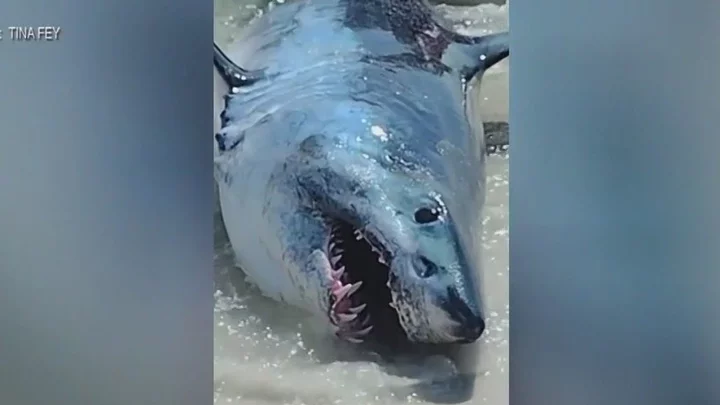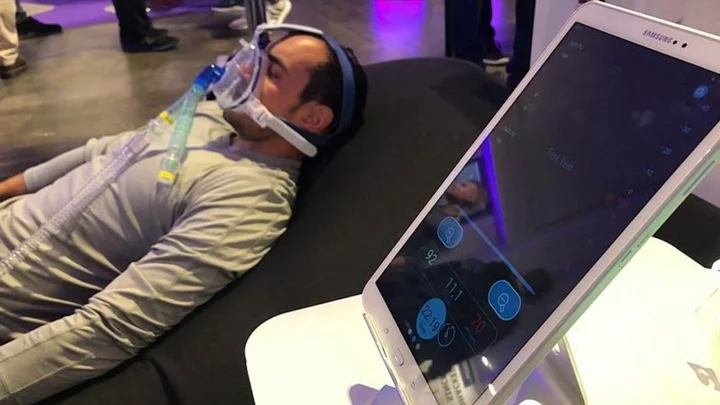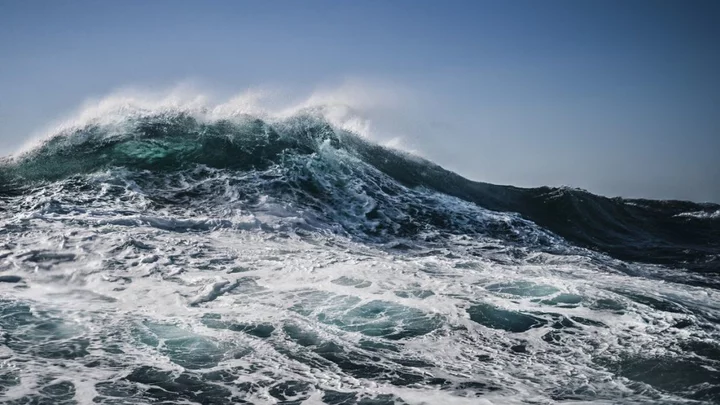
Great white sharks keep entering the twilight zone and experts are mystified
Great white sharks are displaying unprecedented behaviours, and experts can’t explain why. One of the ocean’s greatest apex predators has been entering the twilight zone way beneath the surface of the ocean, and far beneath the areas they normally feed in. The twilight zone, also referred to as the mesopelagic zone, is the area 200 to 1,000 metres down below the surface which is at least partly permeated by sunlight. The midnight zone, meanwhile, is found 1,000 to 3,000 metres down and is impenetrable to sunlight. Now, a new study published in the journal PNAS offered insight into the behaviours of 344 tagged predatory fish including great white sharks. Scientists would usually expect the creatures studied to dive to the deep scattering layer (DSL), which is full of small fish and other ocean life forms and therefore attracts more predators than other levels. However, there was also evidence that suggested predators dove down far deeper than the DSL, and scientists don’t know why. According to the research, great white sharks dive down to as deep as 1,128 metres. Camrin Braun is assistant scientist at the Woods Hole Oceanographic Institution and study lead. Braun told Live Science: "How, when, where they access the deep ocean certainly varies, but the clear anecdotal answer is that the deep ocean seems like an important habitat regardless of the predator species. It's clear there are good reasons for these animals to dive deep, otherwise why would they all do it? "There's good evidence for some species/situations in which diving deep is clearly for foraging," Braun added. "So that supported our expectation. However, we also find several cases where we can pretty definitively say the use of the deep ocean is not for feeding – or if it is it represents a totally different kind of predator-prey interaction or mysterious prey resource." The study could suggest that the twilight zone could be far more important to great white sharks and other predatory fish than previously thought. "If it turns out that there is indeed more biomass in the twilight zone than in all current marine capture fisheries combined then it's possible to imagine a kind of mesopelagic 'gold rush' to catch and use this biomass," Braun said. "There are many 'ifs' in this chain and many issues in making mesopelagic fishing feasible but it seems that biomass may be important for predators. Therefore, we really need to better quantify those links between predators and mesopelagic biomass before we can sustainably harvest/use those resources.” Sign up for our free Indy100 weekly newsletter How to join the indy100's free WhatsApp channel Have your say in our news democracy. Click the upvote icon at the top of the page to help raise this article through the indy100 rankings
2023-11-22 23:16

Sam Altman to return as OpenAI CEO after his tumultuous ouster
By Jeffrey Dastin and Aditya Soni SAN FRANCISCO (Reuters) -Sam Altman is returning as CEO of OpenAI just days after
2023-11-22 21:19

What is biohacking – the latest wellness trend taking over TikTok?
Biohacking is the latest wellness trend taking the internet by storm, with TikTok witnessing a staggering 316 per cent increase in searches. More notably, Bryan Johnson, the founder of KernelCo and Blueprint, has contributed to the intrigue after investing approximately $2 million per year to reduce his biological age. The 46-year-old tech tycoon recently made headlines for tracking his nighttime erections, in an attempt to reach the level of an 18-year-old. How exactly does he do that, you may ask? Well... He gives himself electric shocks in his private area. Johnson told Steven Bartlett on The Diary of a CEO podcast that nighttime erections "are actually a meaningful health indicator" because they "represent psychological health, cardiological health." While that's one extreme measure of biohacking, there are other methods behind the trend. A spokesperson for Snusboss said: "Biohacking refers to the practice of making changes to one’s biology, typically through self-experimentation and the use of technology, to enhance physical and cognitive abilities, optimize health, and achieve personal goals." “Currently #biohacking has 791 million views on TikTok, and continues to gain popularity, particularly with Millennials and Generation Z who are becoming more interested in the scientific research behind their health and wellbeing and are also open to experimenting with new techniques," he continued. Biohacking is essentially an unconventional experimental biotechnology that is believed to help improve overwell wellbeing. Here are several ways people are implementing into their lives: Ice cold plunge "Cold plunging is an aspect of cold-water therapy or cold-water immersion, which involves immersing oneself in cold water temperatures. "It is recommended to complete 11 minutes of cold-water exposure per week, which can be broken into three minutes per session. "Studies suggest 50 to 59 degrees Fahrenheit (10 to 15 degrees Celsius) to be an optimal temperature range for cold plunges focused on reducing muscle soreness. "Doing this will also help to reduce inflammation, improve circulation, and enhance recovery after exercise. It is also shown to boost the immune system, improve sleep quality and help with stress management." Optimise your sleep "If you are getting around seven to nine hours of sleep a night, you will encourage muscle growth and repair, help keep your brain alert, improve your blood sugar levels and even enhance your lifespan. "Whilst there are several tips on social media such as eating certain fruits before bed, avoiding electronic devices and avoiding alcohol, one of the most important rules of optimizing sleep is maintaining a good circadian rhythm. "This means going to bed and waking up at the same time every day, even on weekends. To do so, try maintaining a routine and try to spend time outdoors during daylight, especially in the morning. This is because natural light exposure helps regulate your body's internal clock and promotes alertness during the day. "To measure progress, you can use devices such as smartwatches that track sleep duration and quality." Regular saunas "Saunas, small rooms heated with hot air or steam, are said to have cardiovascular health benefits. "When exposed to high temperatures, the body then works to cool itself down by increasing heart rate, blood flow, and cardiac output. This is known to decrease blood pressure, leading to benefits for cardiovascular health and longevity. "For best results from this biohack, choose a temperature between 175-195F (80-90C) with 10-20 per cent humidity for 30 minutes at least three times a week." Himalayan salt in water "Electrolyte levels are important for the body to function properly. They help to balance the amount of water in your body, balance your acid/base (pH) levels and move nutrients into your cells. "Your body makes electrolytes naturally, as well as obtaining them from food, drinks and supplements. "However, if your levels drop, mineral-rich Himalayan salt contains lots of electrolytes and is proven to help detox the body, supporting kidney and liver functions. "Therefore, around one teaspoon of Himalayan salt added to one litre of water is recommended per day. "Not only will it keep you feeling energised, but also help to boost your metabolism." Moderate coffee intake "Low to moderate doses of caffeine (50–300 mg) are scientifically proven to cause increased alertness, energy, and ability to concentrate. "Science also suggests drinking two cups of coffee a day could help ward off heart failure when a weakened heart has difficulty pumping enough blood to the body. "Both regular and decaf coffee have a protective effect on the liver. Research shows that coffee drinkers are more likely to have liver enzyme levels within a healthy range than people who don’t drink coffee. "Experts say it is healthy to drink a maximum of 2.5 cups of coffee per day." Breathwork "We breathe every single day, but we often don’t even think about how we are breathing. "In times of stress, our breath automatically responds by shortening and speeding up and this can cause further strain on the body. "With breathwork practice, the body can be trained to automatically control breathing and utilize it as a calming tool during times of stress. "Breathing also directly affects how much oxygen our cells are getting, so when we deepen and slow down the breath from its usual pattern, we allow more oxygen to enter each cell. "To practice breathwork, inhale for 4 seconds and exhale for 6 seconds. Repeat this for around 10 minutes per session. For best results, do this once in the morning and once in the evening." Red Light Therapy (RLT) "Red light therapy (RLT) is a popular method used to optimize overall skin health. RLT also helps to boost muscle recovery, reduce pain and inflammation, support nervous system health, and generally increase energy levels. "For those who experience inflammation and pain with Achilles tendinitis, and have signs of skin ageing and skin damage, research shows RLT may smooth your skin and help with wrinkles. RLT is also known to help with acne scars, burns, and signs of UV sun damage. "To complete the treatment, lie in a full-body LED red light bed or pod or be treated by a professional with a device that's outfitted with panels of red lights. "Professionals recommend trying red light therapy three times per week for 10 minutes each time for a minimum of one month." How to join the indy100's free WhatsApp channel Sign up for our free Indy100 weekly newsletter Have your say in our news democracy. Click the upvote icon at the top of the page to help raise this article through the indy100 rankings.
2023-11-22 20:19

Changpeng Zhao, the crypto king and Binance chief, ousted for US crimes
By Tom Wilson LONDON (Reuters) -The most powerful man in crypto has lost his crown - and could see his
2023-11-22 19:24

Indian foodtechs Zomato, Swiggy get notice for $90 million in unpaid taxes -CNBC TV18
BENGALURU India's top organization for indirect taxes has issued notices on unpaid taxes worth about 7.5 billion rupees
2023-11-22 18:55

Regulators Are Coming for Rule-Breaking Crypto Founders Like Binance’s CZ
Changpeng “CZ” Zhao has become the latest in a long line of crypto founders facing potentially significant legal
2023-11-22 18:27

Spain's watchdog clears Amazon, Booking.com, Tripadvisor over fake reviews
Spain's anti-trust watchdog on Wednesday cleared Amazon, Booking Holdings and Tripadvisor of participating in or facilitating fake reviews
2023-11-22 18:22

TikTok Mulls Investing in Indonesia’s GoTo to Revive Online Shop
ByteDance Ltd.’s TikTok is in talks to invest into a unit of Indonesia’s GoTo Group, one of several
2023-11-22 18:16

Stock That Crashed 95% on Xi’s Edtech Crackdown Is Roaring Back
One of the biggest losers from Chinese President Xi Jinping’s crackdown on the private sector has turned into
2023-11-22 17:49

Scientists discover giant missing blob of water in the middle of the Atlantic
To the uninitiated, there isn’t much to water. Sure, the world’s oceans are filled with monsters, marvels and mysteries but, otherwise, they’re just vast, singular expanses of liquid. Right? Wrong. Far from being uniform everywhere, ocean water is a patchwork of interlinked layers and masses which mix and split apart thanks to currents, eddies, and changes in temperature or salinity. Indeed, beneath the surfaces of our great seas, there are waterfalls, rivers and even gigantic blobs, stretching thousands of miles, that somehow manage to evade detection. Now, scientists have discovered one of these massive blobs in the middle of the Atlantic Ocean; extending from the tip of Brazil to the Gulf of Guinea. Until the discovery of this water mass – which has been named the Atlantic Equatorial Water – experts had seen waters mixing along the equator in the Pacific and Indian oceans, but never in the Atlantic. "It seemed controversial that the equatorial water mass is present in the Pacific and Indian oceans but missing in the Atlantic Ocean because the equatorial circulation and mixing in all three oceans have common features," Viktor Zhurbas, a physicist and oceanologist at The Shirshov Institute of Oceanology in Moscow, told Live Science. "The identified new water mass has allowed us to complete (or at least more accurately describe) the phenomenological pattern of basic water masses of the World Ocean." As the name suggests, the Atlantic Equatorial Water is formed by the mixing of separate bodies of water by currents along the equator. To distinguish such masses from the water surrounding them, oceanographers analyse the relationship between temperature and salinity across the ocean — which determines the density of the seawater. Back in 1942, this charting of temperature-salinity led to the discovery of equatorial waters in the Pacific and Indian oceans, as Live Science notes. Because they are created by the mixing of waters to the north and south, the Indian and Pacific Equatorial waters share similar temperatures and salinities curving along lines of constant density, which make them easy to distinguish from the surrounding water. And yet, for years, no such relationship could be spotted in the Atlantic. However, thanks to data collected by the Argo programme – an international collection of robotic, self-submerging floats which have been installed across Earth’s oceans – the researchers spotted an unnoticed temperature-salinity curve located parallel to the North Atlantic and South Atlantic Central waters. This was that elusive Atlantic Equatorial Water. "It was easy to confuse the Atlantic Equatorial Water with the South Atlantic Central Water, and in order to distinguish them it was necessary to have a fairly dense network of vertical temperature and salinity profiles covering the entire Atlantic Ocean," Zhurbas explained in his email to Live Science. The discovery is significant because it offers experts a better understanding of how oceans mix, which is vital to how they transport heat, oxygen and nutrients around the world. Sign up for our free Indy100 weekly newsletter Have your say in our news democracy. Click the upvote icon at the top of the page to help raise this article through the indy100 rankings
2023-11-22 17:45

Larry Summers Jumps to Center of AI Stage With OpenAI Board Seat
Late on Tuesday night, OpenAI announced the return of Sam Altman, its ousted chief executive officer, along with
2023-11-22 17:16

Factbox-OpenAI's new-look board as Altman returns
ChatGPT-maker OpenAI on Tuesday said it reached an agreement for Sam Altman to return as CEO days after
2023-11-22 16:49
